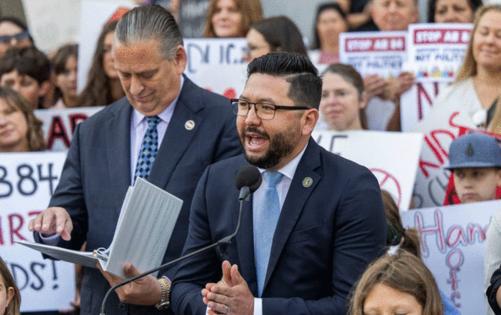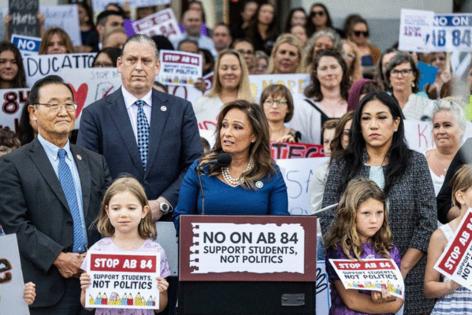How should California charter schools be regulated? Lawmakers must negotiate
Published in News & Features
In the wake of high-profile fraud cases in which charter schools inappropriately collected hundreds of millions of public dollars, California lawmakers are pushing for reform that would aim to prevent similar theft of taxpayer money.
But with two competing bills moving through the Legislature, lawmakers are trying to strike a balance between effectively regulating charter schools and avoiding potential burden on charter school resources due to increased bureaucratic processes. While electeds are pleasantly agreeing to negotiate over the summer, supporters of each respective bill are sharply divided on how far reform should go.
The ongoing debate about charter school reform is a big deal for families and educators across the state, representing California’s own battle in the national war over “school choice.”
Assemblymember Al Muratsuchi’s Assembly Bill 84 would place stricter audit requirements on charter schools and oversight responsibilities on their authorizers, particularly in regard to schools that offer nonclassroom-based homeschooling programs. The bill’s text is largely based on findings and recommendations made by the State Controller, the Legislative Analyst’s Office and the Fiscal Crisis & Management Assistance Team in reports they each issued following the A3 charter school fraud case. It is championed by several educational agencies and school labor unions.
The other bill, Angelique Ashby’s Senate Bill 414, is supported by the charter schools, their advocates and several Republican lawmakers. Proponents of the legislation say that it strengthens charter school accountability but avoids unnecessary overreach which would overburden their already tight budgets. Opponents of SB 414 say that the bill doesn’t have the teeth to effectively prevent fraud and ensure adequate spending of public money.
Summer negotiation is likely to result in one consolidated bill, but concessions must be made. In an interview Tuesday, Muratsuchi, D-Torrance, said that he “will not compromise on the ultimate goal of strengthening charter school oversight and accountability to crack down on the bad actors.” Ashby, D-Sacramento, said on the Assembly Education Committee floor Wednesday that she said that she is not open to anything “punitive” to all charter schools.
“I think at the end of the day, Chair Muratsuchi and myself want the same outcome,” Ashby said. “We’re just trying to figure out the best route there and the one that’s implementable in the time and space that we live in today, which is a down budget, a tough budget, and a time where we need to do two things, have oversights we can afford.
Accountability or bureaucracy
AB 84 seeks to place stricter auditing standards on charter schools and would prohibit a system that currently allows schools to offer money to parents to spend virtually indiscriminately to outsource their children’s education to third-party vendors without the approval of a credentialed educator.
Muratsuchi and other bill proponents liken this system to that of voucher systems in other states, which critics say undermine public education and do more to benefit wealthy families that can already afford a private education rather than families in need.
While the funds are meant to provide families without means to access custom educational programming through vendors, some families have used these checks from charter homeschools to fund family trips to Disneyland and Seaworld.
But charter school advocates reject the notion that these homeschool programs constitute irresponsible taxpayer spending, saying that their charters have been a lifeline for students with disabilities, chronic illnesses or other vulnerabilities that preclude them from success at a public school. They say that AB 84 would “replace choice with control” and cut students’ opportunities to access education outside of public options.
More than 200 charter school parents and students from across the state gathered at the Capitol steps Wednesday morning for a Republican legislator-led rally in opposition to AB 84.
“If you have means in this state, you have school choice,” Assemblymember Josh Hoover, R-Folsom, said at the rally. “You have the opportunity to move to a neighborhood with a fantastic performing traditional public school. You may have the means to send your child to a private school, but if you do not have the means in California, you are left trapped too often in a failing traditional public school, and charter schools, as my colleagues have made clear, are a lifeline for families across our state.”
They later marched to a California Senate Education Committee meeting where they lined up to express their objection to the bill in an hourslong comment period.
Many of these families attend nonclassroom-based charter schools, or as their proponents refer to them, “flex-based” schools. Nonclassroom-based schools include virtual schools without in-person facilities and homeschool programs that offer sums of money to families to pay third-party vendors to provide educational programming.
Some of these schools, due to their structure and remote nature, have been ripe for fraud. A3 is a now-defunct San Diego-area charter school network which raked in $400 million from the state between 2015 and 2019 in what turned out to be the largest fraud scheme perpetrated by a charter school in the state’s history.
More locally, a state audit found earlier this year that Highlands Community Charter and Technical Schools received more than $180 million in inappropriate state funds due to lax oversight by state and local educational agencies. Highlands schools offered both classroom-based and nonclassroom-based programming.
Instead, many of the state’s charter schools and their advocates are throwing their support behind SB 414, which would implement some regulations to prevent charter school fraud but not go as far.
But SB 414’s critics, including state education labor groups and former charter school educators, say that the bill does not adequately hold charters to account and would essentially allow the industry to regulate itself.
Under Ashby’s bill, potential fraud would be monitored through routine annual audits already performed by schools, which have not historically been the way fraud has been identified.
“(SB 414) wants to use the routine audits as a way to monitor potential fraud, waste, abuse, and the issue with that is those audits already exist,” former Highlands teacher Lena Alrayes said. “Highlands had them every year, and their authorizer, Twin Rivers, has never seen anything of ‘concern.’ All of these issues have been happening for years, and if we just relied on this image, nothing would have been done.”
AB 84 and SB 414 were heard in the Senate and Assembly Education Committees, respectively, Wednesday. They were both voted forward and will continue to undergo negotiations over the summer.
_____
©2025 The Sacramento Bee. Visit sacbee.com. Distributed by Tribune Content Agency, LLC.












Comments